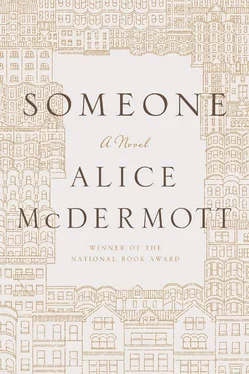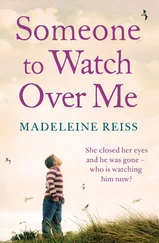We walked down the stairs. I felt a panic at each turning—what if his mother came through the door now, or now, what would she read on our faces? But he took his time. On the street—the air was lovely, a slight breeze had kicked up and it felt like bathwater against my skin—he put his arm around my waist as we walked. We passed the church. Had it only been this morning that he looked down at me with the sunlight across his face and asked, “What’s wrong with your eye?”
“Well, at least,” he said, “we won’t have to fight over whose church we’ll get married in, yours or mine. Both our mothers will be happy. What do you have,” he asked, “one more year till graduation, right?”
I said yes.
“Get a job downtown Brooklyn,” he said. “You don’t want to go into New York City.”
We came around the other side of the block. Mr. and Mrs. Chehab were in the bay window of the parlor floor, their backs to the street and a two-headed lamp between them. He paused at our steps.
“Here you are,” he said. He put his hands in his pockets and shifted a little bit on his uneven legs. He may have been feeling the two quick bottles of beer. There was another couple walking down the other side of the street, toward the subway, and his eyes followed. This time, I turned to gaze at them, too. The woman wore a tight skirt across a wide bottom and her heels were clicking. The man’s suit jacket was long, with a belt across the back. Together Walter and I turned to face each other again, but this time he did not go through that momentary, disinterested amnesia. Rather, he raised his chin and shot a finger into the air—as he’d done all evening when he acknowledged people in the candy store and on the street—a wordless “I know you”—and then let his eyes fall, and linger, on my breast, the one he had exposed and suckled. He grinned. I know you.
In the first throes of my first foray into love’s irrational joys, I felt both the thrill of his acknowledgment and the hot black rush of shame.
“Go on in,” he said, touching my hip. “Go tell your mother you’ve got a boyfriend.”
All the thought and all the worry, all the faith and the philosophy, the paintings and the stories and the poems, all the whatnot, gone into the study of heaven or hell, and yet so little wonder applied to the sinking into sleep. Falling asleep. All the prayers I had said before bed throughout my life, all the prayers I had made my children say—Our Father, Hail Mary, Glory Be—the Confiteor if some transgression had taken place—missed the mark entirely. It was grace, the simple prayer before meals, that we should have been murmuring into our clasped hands at the end of the day: Bless us, oh, Lord, and this thy gift, which we are about to receive.
Driving back from Calvary Cemetery in the undertaker’s car, pressed into my mother’s side, I had sunk into the sweetest sleep I had ever known. They had put my father in the ground and my world was shattered, but the nap I had in Fagin’s car driving home was like a long draft of cool nectar—sweet and deep and fragrant, washed with an ivory light (was it the winter sun passing through the window?)—the kind of sleep that came only in the aftermath of many tears. When the car pulled to the curb in front of the restaurant where the funeral luncheon was to be held, my mother gently woke me. Only Gabe, in his Roman collar, disapproved. His own eyes were red-rimmed and bloodshot; there were hollows in his pale cheeks. “You slept?” he said. He had ridden in front, beside the driver. “How could you have slept?”
Now, lying beside my mother in the bed we shared because Gabe had come home from his first parish, saying only that the priesthood was not for him, I passed my life’s first sleepless night in joy and shame and confusion. I could not put my hand to my tender breast—bruised (I had seen in the bathroom mirror as I undressed) around the nipple, marked with two rose-colored bites—in case my mother, even in the shadows, should see what I was doing. I could not tamp down the smoldering shame. I felt it coil, wire-thin, down my spine. I felt it touch or spark something that flared and flashed and made guilt and confusion feel like pleasure, like joy. I was in love. Walter Hartnett with the gray eyes loved me. Next year we would be married in Mary Star of the Sea and those eyes would never again fall on me with cold indifference. I know you.
My mother said, in the darkness, “Do you want some hot milk, Marie?”
“No,” I said.
“Can’t you sleep?”
“No,” I said.
“Can you at least try to be still?” my mother said. “It’s three a.m. I’ve got to work in the morning.”
“Sorry,” I whispered.
The ticking of the bedside clock had never before sounded so cruel. The windows were broad, uneven strokes of pale gray, hastily painted on the long black wall beyond the bed. The windows were opened to the cool night, but no particular breeze stirred. What sounds came from the street were distant, indistinguishable. Not even the scratching of a mouse behind the walls or of my brother’s cough from the next room. Everyone else on this street was still. Everyone else had fallen into the cool ivory light, fallen asleep.
“Is Walter Hartnett a nice boy?” my mother whispered.
I said, “Yes,” but could add nothing more. Already I felt the hot flush on my cheeks.
My mother rolled over, bouncing the mattress we shared, and then pulled the thin sheet up over her shoulder. “I like his mother,” she said. “Her people are from Armagh.”
By month’s end, he was riding the extra stop on the subway every night on the way home from work, walking past our house, where he would always pretend to be surprised to find me sitting on the steps, waiting for him. He would lean against the balustrade, cock the toe of his built-up shoe into the sidewalk, and talk about his work, our wedding, the guys he wouldn’t want to be, his eyes sliding, always, from my face to my breast and then rising up to my face again, his eyebrows raised as if to say, “Remember?” As if the flush that rose to my cheeks didn’t tell him I remembered.
We went to the movies together and a party once, where he drank half a bottle of whiskey and leaned heavily into my side walking home. We took a drive in a caravan of cars to a summer place owned by one Judge Sweeney, whose daughter went with a guy Walter knew. We had a picnic on a lovely lawn, but were only allowed into the house to use the john. Driving back, he said, “Maybe we should get a place like that instead.”
I put my hand through his arm when we walked together, or he put his arm around my waist. He put his arm across my shoulders in the movie theater. At the end of the night, he would kiss me gently, always standing on the sidewalk, at the foot of our steps, never at the door, because, I imagined, he did not want me to turn and watch him limp back down the wide stair.
Even now I can’t say if it was lack of opportunity or part of some plan, but the intimacy of that first Sunday evening was never repeated. And yet it was always there, in every touch that passed between us, certainly in every gesture of his pale eyes. The hours I spent on that first sleepless night imagining what I would say or do when he moved his mouth toward me again gave way to sleepless nights in which I only recollected in lovely detail everything he’d done once, teeth and tongue, his fingers on my spine. I walked beside him in a state of tremulous anticipation. I felt the pulse thrum in my veins every time we neared his block together—would this be the night he would finally say again, “Do you want to come in?” Leaving the party where he’d had too much to drink, he’d leaned heavily against my shoulder in a dark and momentarily deserted vestibule, and for a moment his head dropped onto my chest, his hair brushed my chin, and it was all I could do not to cup my breast myself, offer it to him. On the parklike lawn of Judge Sweeney’s summer house he’d stretched out on the grass beside me, propped on his elbows. He was chatting with the others, and his cheek against my forearm as he spoke and chewed and laughed, the movements of his jaw, filled me with an unbearable recollection of the dark couch and the amber lamp and the bared breast, lit as if from within.
Читать дальше












